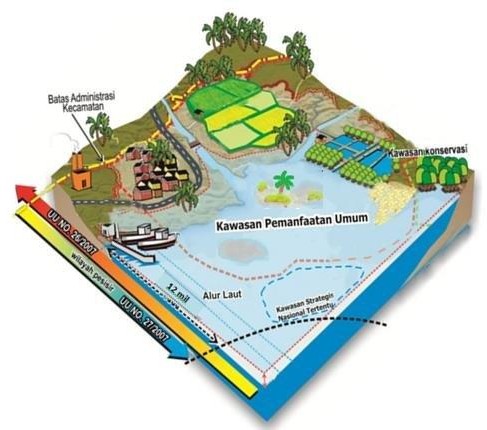THE ROLE OF TECHNOLOGY IN INCREASING COASTAL HUMAN CAPACITY
Main Article Content
Abstract
This research explores the role of information and communication technology (ICT) in enhancing human resource capacity in coastal areas. The aim is to analyze how ICT has influenced education, training, productivity, and climate change adaptation in coastal regions. The research involves statistical data analysis on internet access and interviews with coastal residents.The results show that ICT has broadened access to education and training, facilitated global knowledge exchange, and provided more efficient reference resources. Technology also plays a role in improving productivity and climate change adaptation in coastal communities.In conclusion, ICT plays a crucial role in enhancing coastal human resource capacity. Collaboration among stakeholders is key to ensuring technology is used wisely in sustainable planning and management. Keywords: information and communication technology, coastal areas, education, climate change, human resource capacity.
Downloads
Article Details
References
L. Zamzami, “Dinamika Pranata Sosial Terhadap Kearifan Lokal Masyarakat Nelayan Dalam Melestarikan Budaya Wisata Bahari,” J. Antropol. Isu-Isu Sos. Budaya, vol. 18, no. 1, p. 57, 2016, doi: 10.25077/jantro.v18i1.53.
H. Awalia, A. Nasrullah, F. Hilmi, P. S. Sosiologi, and U. Mataram, “Peningkatan kapasitas perempuan pesisir di pantai cemara kabupaten lombok barat,” vol. 6, 2023.
Donna NP Butarbutar, Lelo Sintani, and Luluk Tri Harinie, “Peningkatan Kesejahteraan Ekonomi Masyarakat Pesisir Melalui Pemberdayaan Perempuan,” J. Environ. Manag., vol. 1, no. 1, pp. 31–39, 2020, doi: 10.37304/jem.v1i1.1203.
H. Zhang and F. Gui, “The Application and Research of New Digital Technology in Marine Aquaculture,”
J. Mar. Sci. Eng., vol. 11, no. 2, 2023, doi: 10.3390/jmse11020401.
S. P. Saragih, “Implementasi Platform Media Sosial Sebagai Business Support oleh Pelaku Usaha Wisata di Kota Batam,” J. Appl. Informatics Comput., vol. 2, no. 2, pp. 15–23, 2018, doi: 10.30871/jaic.v2i2.1016.
H. F. Bahrul Ulumi and M. Syafar, “Pengembangan Ekowisata Pulau Tunda Berbasis Komunitas dalam Era Industri 4.0,” J. Antropol. Isu-Isu Sos. Budaya, vol. 23, no. 1, p. 118, 2021, doi: 10.25077/jantro.v23.n1.p118-120.2021.
H. Yanfika, I. Nurmayasari, R. T. Prayitno, A. Nugraha, A. G. Zainal, and R. Perdana, “Peningkatan Kapasitas Masyarakat Pesisir Melalui Literasi Digital,” J. Sumbangsih, vol. 3, no. 1, pp. 16–20, 2022.
L. M. Lautetu, V. A. Kumurur, and F. Warouw, “Karakteristik Permukiman Masyarakat Pada Kawasan Pesisir Kecamatan Bunaken,” Karakteristik Permukim. Masy. Pada Kaw. Pesisir Kec. Bunaken, vol. 6, no.1, pp. 126–136, 2019.
R. G. Utomo and Y. Rosmansyah, “Framework untuk Mendesain Sistem Massive Open Online Courses (MOOCs) untuk Universitas di Indonesia,” Edsence J. Pendidik. Multimed., vol. 2, no. 2, pp. 65–74, 2020, doi: 10.17509/edsence.v2i2.29776.
I. G. Riana, “Master Plan UMKM Berbasis Perikanan untuk Meningkatkan Pengolahan Produk Ikan yang Memiliki Nilai Tambah Tinggi,” J. Ekon. Kuantitatif Terap., vol. 7, no. 2, pp. 102–119, 2014.
M. Effendi, “Integrasi Pembelajaran Active Learning dan Internet-Based Learning dalam Meningkatkan Keaktifan dan Kreativitas Belajar,” Nadwa J. Pendidik. Islam, vol. 7, no. 2, pp. 283–309, 2016, doi: 10.21580/nw.2013.7.2.563.
I. W. Yuliarta and H. K. Rahmat, “Peningkatan Kesejahteraan Melalui Pemberdayaan Masyarakat Pesisir Berbasis Teknologi Sebagai Upaya Memperkuat Keamanan Maritim di Indonesia,” J. Din. Sos. Budaya, vol. 23, no. 1, pp. 180–189, 2021.
C. Cvitanovic, A. J. Hobday, L. van Kerkhoff, S. K. Wilson, K. Dobbs, and N. A. Marshall, “Improving knowledge exchange among scientists and decision-makers to facilitate the adaptive governance of marine resources: A review of knowledge and research needs,” Ocean Coast. Manag., vol. 112, pp. 25–35, 2015, doi: 10.1016/j.ocecoaman.2015.05.002.
N. Hayati and T. R. D. A. Nugroho, “Pengembangan Agroindustri Wilayah Pesisir Berbasis Komoditas Unggulan Ikan Hasil Tangkapan,” Agriekonomika, vol. 7, no. 1, p. 1, 2018, doi: 10.21107/agriekonomika.v7i1.3590.
B. Maunah, NAVIGASI DIGITAL , INOVASI TEKNOLOGI , DAN SUPPORT SYSTEM. .
R. S. Naibaho, “Peranan Dan Perencanaan Teknologi Informasi Dalam Perusahaan,” no. April, pp. 1–12, 2017.
B. D. S. Wiwin Djueriah, Mochamad Jurianto, “Pengaruh Teknologi Informasi Komunikasi Dan Budaya Masyarakat Pesisir Labuan Terhadap Keamanan Maritim,” Keamanan Marit., vol. 7, no. 2, pp. 223–235, 2021, [Online].Available:https://jurnalprodi.idu.ac.id/index.php/KM/article/view/1023%0Ahttps://jurnalprodi.idu.ac.id/index.php/K M/article/download/1023/862.
A. Susanto, “Strategi Pengelolaan Wilayah Pesisir Kecamatan Kuala Jelai Kabupaten Sukamara Berbasis Integrated Coastal Zone Management (ICZM),” J. Ilm. Samudra Akuatika, vol. 3, no. 2, pp. 21–30, 2019, [Online]. Available: https://ejurnalunsam.id/index.php/jisa/article/view/1787.
K. K. Sangihe, “Pemberdaan Masyarakat Pesisir Dalam Meningkatkan Kesejahteraan Di Desa Mahumu Dua Kecamatan Tamako Kabupaten Kepulauan Sangihe,” J. Eksek., vol. 1, no. 1, p. 3, 2017.
T. C. Trinanda, Matra pembaruan. 2017.
A. Alaudin, I. Zakiya, B. Burhanis, R. A. Munandar, and M. Kadhafi, “The Use Of Remote Sensing In Mapping The Distribution Of Chlorophyl In Belawan Waters”, zonalaut, vol. 5, no. 1, pp. 23-27, Mar. 2024.

